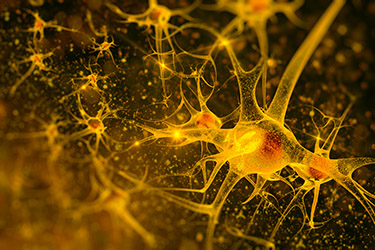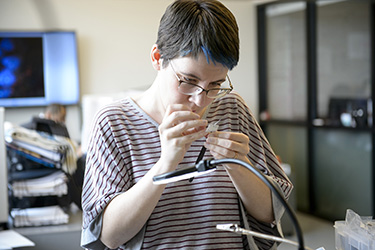On this page:
- Why Choose the Physiology and Neuroscience Program?
- Careers
- Real-World Experience: Undergraduate Research
- Academics and Curriculum
- Advising
- Admission
Why Choose the Physiology and Neuroscience Program?
The Physiology and Neuroscience curriculum offers students an in-depth foundation in physiology and neuroscience developed from the ground up by an interdisciplinary team of Wright State University faculty. This program uniquely emphasizes how prerequisite coursework from multiple fields of science relates to and can be applied to physiological and neuroscientific concepts. This is achieved via pedagogical best practices focused on engaging students in their learning such that they are actively involved in understanding these concepts and fostering scientific creativity and critical thinking.
The Program’s coursework focuses on foundational neuroscience topics related to cellular neuroscience, physiological neuroscience, and behavioral neuroscience. Additionally, coursework will be complemented with foundational physiology and anatomy topics related to homeostasis, metabolism, and the function and structure of various organ systems of the body. These will be supplemented with training in fundamental research techniques, as well as opportunities to work with faculty members on cutting-edge research in these fields.
This Program will aid in students being competitively prepared for careers in a variety of fields, including, but not limited to: scientific research, medicine, education, biotechnology, public policy, scientific writing, and law.
Program Learning Goals and Skills
The Bachelor of Science in Physiology and Neuroscience program is focused on in-depth physiology and neuroscience content knowledge centered around four main learning goals:

- Organization of Various Systems of the Body – There are particular groups of cells that comprise various organ systems of the body, which are necessary for each system to contribute to its unique functional roles.
- Cellular and Organ System Physiology – Cells have varying functional roles based upon their locations, connections, gradients, and molecules they are comprised of. These cellular functions underlie how organ systems work.
- Peripheral and Central Information Processing – Information from an organism’s environment is conveyed from the periphery centrally in order to appropriately respond to that information and attempt to keep the functions of the body within a normal range.
- How Various Systems of the Body Work Together to Elicit Responses to Conditional Needs – Information can be conveyed across large groups of organ systems to make necessary modifications depending upon the situational need an organism finds itself in.
In addition to the content knowledge described above, Physiology and Neuroscience majors will develop an array of broadly applicable skills, including:
- Independent learning
- Ability to critically evaluate evidence (how to read critically, write scientifically, and conduct scholarly searches)
- Proficiency in a variety of laboratory research techniques (ex. microscopy)
- Ability to work collaboratively with colleagues/peers
- Effective communication (oral and written)
- Quantitative literacy
- Ability to implement the scientific process
- Ability to problem solve
- Research design competency (ability to apply logic and statistics)
Careers
Most students majoring in physiology and neuroscience are interested in pursuing health-related careers. However, there are a number of other career fields you can pursue with an undergraduate physiology and neuroscience degree, including research, sales, law, public policy, and others.
You may need to pursue advanced graduate or professional education to achieve your career goals. The Bachelor of Science in Physiology and Neuroscience program has been designed to meet entrance requirements for these advanced programs, aiding in achieving your future plans.
Throughout the progress of the degree program, you will be given the tools and appropriate advisement to succeed along whatever trajectory your path takes.
Occupations
- Advertising/marketing
- Audiologist
- Biostatistician
- Clinical research assistant
- Dentist
- Epidemiology
- Food scientist
- Genetic counselor
- Lawyer
- Medical doctor
- Medical manager
- Occupational therapist
- Optometrist
- Pharmaceutical sales
- Pharmacist
- Physical therapist
- Physician’s assistant
- Professor
- Psychologist
- Public health
- Research scientist
- Science advocacy
- Science writer
- Speech/language pathologist
- Veterinarian
Useful Links
- Society for Neuroscience: NeuroJobs Career Center
- Wright State University Career Services
- American Physiological Society Career Gateway
Student Success
- Abagail Chumley (Spring 2020) – Worked for a year for the Chair of the Ohio House Health Committee, and now serves as a legislative aide in the Ohio Senate for Senator Reineke. Currently studying for the MCAT with the goal of continuing to be involved in healthcare legislation/lobbying upon obtaining her M.D.
- Melinda Meiring (Spring 2019) – Pursuing a Ph.D. at Michigan State University studying structural brain networks and how they're affected by aging in normal and Alzheimer's brains.
- Erin Tomlin (Spring 2021) – Attending the Physician Assistant Program at the University of Evansville.
- Adrian Williams (Spring 2021) – Attending Albert Einstein College of Medicine in the Medical Scientist Training M.D./Ph.D. Program.
- Spencer Wilson (Spring 2021) – Army Reservist who completed the 4+1 Program in Neuroscience (B.S.) and Physiology and Neuroscience (M.S.). Intending to work in the pharmaceutical industry.
Real-World Experience: Undergraduate Research

You will have the opportunity to collaborate with faculty and their lab members by conducting Independent Research in Neuroscience (NEU 4990). This can be taken as an elective option, or as part of the requirement for the laboratory research-focused senior capstone.
Neuroscience Departmental Honors Program PDF
A list of faculty, their contact information, and their research interests can be found on the departmental website's People: Faculty, Staff, & Students page. You are encouraged to read over these and meet with faculty to discuss available research opportunities. If you want to register for Independent Research in Neuroscience, you must obtain departmental permission.
View an extensive and updated list of physiology and neuroscience internships and research opportunities.
Academics and Curriculum
View Bachelor of Science in Physiology and Neuroscience program information, degree requirements, and graduation planning strategy in the Academic Catalog.
Advising
Schedule an appointment with an advisor by calling 937- 775-4496. We look forward to helping you meet your goals!
Undergraduate Advisor:
Patrick Sonner, Ph.D.
Director of the Undergraduate Physiology and Neuroscience Program
patrick.sonner@wright.edu
Admission
All students are eligible to be directly admitted into the Bachelor of Science in Physiology and Neuroscience program.
You must first apply for admission to Wright State University, and indicate Physiology and Neuroscience as your desired major.
